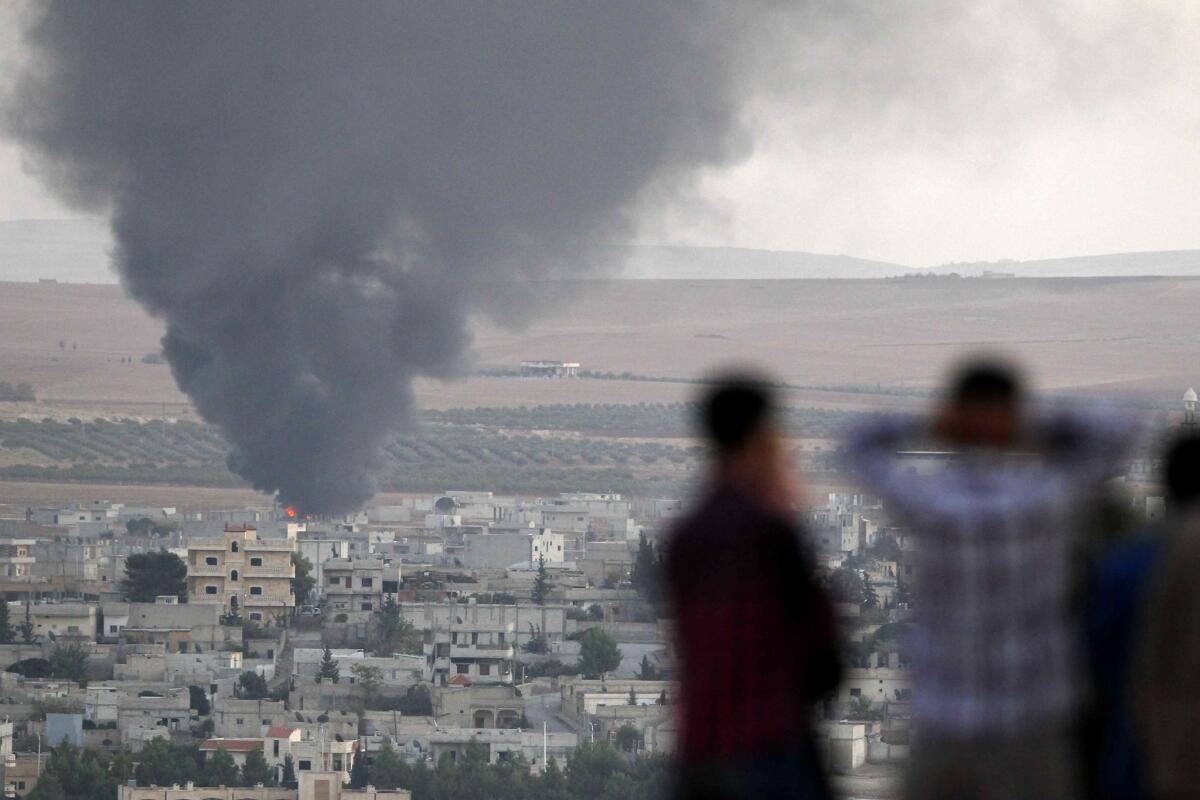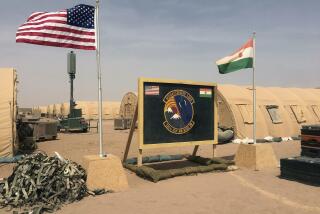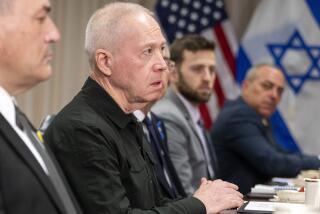U.S. calls on Turkey’s military as Islamic State moves on border town

Defense Secretary Chuck Hagel wants more participation from Turkey in the campaign against Islamic State militants, saying the country could help with a range of military issues that include allowing U.S. aircraft to use its bases and training and equipping moderate Syrian rebels.
He made the comments en route to Colombia on Thursday as John R. Allen, a retired Marine Corps general and the special envoy coordinating the U.S.-led international effort against the Islamic State, arrived in Ankara, the Turkish capital, to persuade its government to take a more active role against the Sunni Muslim extremists.
Turkey has one of the region’s largest armies and is an important U.S. ally, but has not moved against Islamic State fighters on its 500-mile border with Syria. One Syrian border city, Kobani, has been facing an onslaught since last month, forcing nearly 130,000 people, most of them Kurds, to flee to Turkey.
Turkish officials want a buffer zone along the border to stem the flow of refugees and stop the spillover of violence. The country also wants to the U.S. to establish a “no-fly” zone, in which fighter jets would regularly patrol the border and shoot down military aircraft that breach it.
For now, Hagel said, neither proposal is being considered by the U.S. government.
“A ‘no-fly’ zone presents many complications,” he said on a military plane en route to Bogota, the Colombian capital, the first leg of a five-day trip through South America.
U.S. and Arab allies’ aircraft have carried out 30 airstrikes since Tuesday on Islamic State forces near Kobani. The militants now control between one-quarter and one-third of the besieged city, according to local officials.
Islamic State fighters have cut off Kobani, also known as Ayn al-Arab, from supply routes in Syria. Reinforcements from allied, Kurdish-controlled areas in northern Syria cannot help because they must pass through extremist-held territory to reach the city.
The Turks also have not allowed military aid to reach Kobani. This has triggered outrage among ethnic Kurds and led this week to violent demonstrations across Turkey. At least 25 people were killed in clashes, marking some of the nation’s most violent civil unrest in years, local media reported. Authorities imposed curfews and brought in security reinforcements to restore order.
Kobani’s Kurdish defenders are allied with Turkey’s longtime nemesis, the Kurdistan Workers’ Party, or PKK. Turkey has been alarmed at the establishment of pro-PKK, semiautonomous Kurdish zones in Kobani and elsewhere along the Turkish border in northern Syria.
Islamic State militants are reportedly continuing to advance despite the accelerated pace of U.S-led airstrikes, including 11 on Wednesday and Thursday. U.S. officials have cautioned that airstrikes would be of limited effectiveness in defending the city.
U.S. officials have said they are not in communication with the Kurdish militia in Kobani and do not think they yet have an effective partner on the ground in Syria. They hope to train and equip moderate Syrian rebels over the next year, but first must vet the groups.
“This is an imperfect and difficult assignment,” Hagel said. “We recognize that.”
Interested in the latest news from the Pentagon? Follow @wjhenn for military and defense info
More to Read
Start your day right
Sign up for Essential California for news, features and recommendations from the L.A. Times and beyond in your inbox six days a week.
You may occasionally receive promotional content from the Los Angeles Times.







